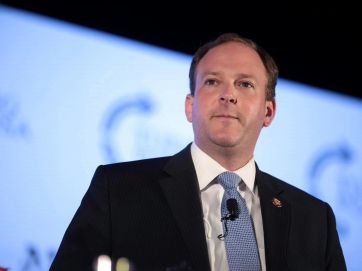On March 4, 2015, NAS president Peter Wood wrote a letter to 20 Members of Congress, urging them to deny President Obama's request to increase the budget of the Department of Education’s Office for Civil Rights by 31 percent.
The Honorable Thad Cochran, Chair, Senate Committee on Appropriations
The Honorable Roy Blunt, Chair, Subcommittee on Labor, Health and Human Services, Education and Related Agencies
The Honorable Hal Rogers, Chair, House of Representatives Committee on Appropriations
The Honorable Tom Cole, Chair, Subcommittee on Labor, Health and Human Services, Education, and Related Agencies
The Honorable Shelly Moore Capito
The Honorable Richard Shelby
The Honorable Jerry Moran
The Honorable James Lankford
The Honorable Lamar Alexander
The Honorable Lindsey Graham
The Honorable Mark Kirk
The Honorable Bill Cassidy
The Honorable Chuck Fleischmann
The Honorable Scott Rigell
The Honorable Martha Roby
The Honorable Steve Womack
The Honorable Andy Harris
The Honorable Charlie Dent
The Honorable Michael Simpson
The Honorable Lucille Roybal-Allard
Dear Distinguished Members of Congress:
I urge you to reject President Obama’s request to increase by 31 percent the budget of the Department of Education’s Office for Civil Rights (OCR). The large increase proposed by the president would validate and reinforce this body’s poorly conceived and destructively intrusive interpretations of its authority under Title IX of the Higher Education Act. OCR needs to be reined in, not licensed to engage in further mischief.
I am a member of the New York State Advisory Committee to the United States Commission on Civil Rights, but I write as the President of the National Association of Scholars (NAS). NAS is an organization of college and university professors, administrators, graduate students, and public members which was founded in 1987 as a voice for academic standards and intellectual freedom. In the years since, we have opposed the devolution of Title IX from its original good purpose to establish equal opportunity for women on college campuses throughout the country, to an instrument for combatting sexual harassment, to a weapon in the campus wars against “sexual misconduct,” and finally a means for colleges to establish tribunals in sexual misconduct cases that threaten the liberties of American students. Each of these annexations of additional territory to the original idea has actually ended up diminishing the principle of equal opportunity.
The creation of these college tribunals in response to pressure from OCR has alarmed faculty members across the country. Of special note are the open letters issued by 27 Harvard University Law School faculty members and 16 University of Pennsylvania Law School faculty members. In both cases these distinguished law faculty criticized the measures that their own institutions took to align with OCR. I’ll come back to these letters, but let me first explain why I am writing to you.
NAS first wrote an analysis of sexual harassment claims on American college and university campuses in 1988, in the inaugural issue of our journal, Academic Questions. On January 1, 1993, we issued a now-famous statement on sexual harassment on campus, “Sexual Harassment and Academic Freedom,” that states forthrightly that “sexual harassment is always contemptible,” but we also denounced instances of “misguided efforts to combat sexual harassment” as a threat to “academic freedom and the rights of individuals.” On those grounds, NAS has been involved in numerous cases in which we defended the rights of accused academics and students by insisting on due process.
Over the years, NAS has watched Title IX transform from a tool to ensure equal opportunity for women into a device used to crackdown on colleges and universities for insufficient vigilance on sexual harassment and sexual assault, and therefore rape, and the fusion of sexual harassment and sexual assault into a single concept, namely sexual misconduct. This was not how Title IX was envisioned in the United States Education Amendments of 1972, and its alteration has been disastrous for college and university life. Title IX says:
No person in the United States shall, on the basis of sex, be excluded from participation in, be denied the benefits of, or be subjected to discrimination under any education program or activity receiving federal financial assistance.
Today, OCR is interpreting Title IX as requiring colleges and universities to try sexual assault and harassment cases through campus-run tribunals. This interpretation minimizes the proper role of law enforcement. OCR is also interpreting Title IX as requiring that campus authorities need to find only a “preponderance of evidence” to establish the guilt of the accused, rather than meet the long-established standard for a “clear and convincing” burden of proof.
Those quoted words come from OCR’s April 2011 “Dear Colleague” letter. In light of the grave seriousness of accusations of sexual assault and rape, it is astonishing that OCR would seek to circumvent the due process standards deeply established in American jurisprudence. Those standards existed to protect both the rights of accuser and accused. Indeed, OCR has tipped the scales so heavily against the accused that it allows, in the case of an acquittal, the accuser to appeal and initiate a re-prosecution. OCR has moved far beyond double jeopardy—this is “infinite jeopardy.” Such imbalances against the accused contradict the original spirit of Title IX, to foster equality between the sexes, not to create a new inequality.
The 2011 “Dear Colleague” letter was a dramatic step by OCR beyond the body’s previous rule-making. This step took OCR (and the nation’s colleges and universities) into novel legal territory, but it also built on previous steps by OCR to appropriate power that Congress never gave it.
In the 1980s, colleges and universities began to issue definitions of sexual harassment that were impossibly broad and vague. For instance, in 1984 the University of Minnesota declared:
Sexual harassment can be as blatant as a rape or as subtle as a look. Harassment...often consists of a callous insensitivity to the experience of women.
The key moment in the legal history of OCR’s expansion is the 1986 U.S. Supreme Court ruling in Meritor Savings Bank v. Vinson. That decision created the legal basis for treating some forms of sexual harassment as violations of the Civil Rights Act of 1964. The Court ruled that sexual harassment could produce a “hostile or abusive environment,” which—and this is key—obstructed equal opportunity. Thus, by way of the concept of “hostile environment,” a path was opened to tying sexual harassment to Title IX. It took some time before OCR seized that opportunity, but on March 10, 1994, OCR did just that. It issued a notice of investigative guidance which embraced the language of “hostile environment.” With this new conceptual tie, OCR began to expand the definition of “harassment,” putting the weight of federal bureaucracy behind what colleges and universities such as the University of Minnesota had already been doing: defining “sexual harassment” very broadly.
In the years since, OCR’s application of the concept of “hostile environment” to sexual harassment has been troublesome. Its ever-expanding definitions of hostile environment muddle investigations into particular cases. No one is sure how to define an “atmosphere” or an “environment.” The Supreme Court’s ruling in Meritor said that actionable sexual harassment “must be sufficiently severe or pervasive” to create a hostile working environment. The “severe or pervasive” standard has been elaborated by lower courts but never changed by the Supreme Court or overwritten by new legislation. Yet OCR has effectively abandoned the “severe or pervasive” standard with judgments of its own.
OCR, in short, cannot be trusted to operate within the precincts of the law. It is making up its own laws and should be reined in by Congress.
OCR’s expansive definitions mean that its authority now extends to nearly the entirety of college and university life and instruction, oversight that it has no actual expertise to wield. By placing sexual assault under such a rubric, OCR gives college and university administrations authority to adjudicate highly-sensitive sexual assault cases, cases that are best left to the police and the criminal court system. OCR thus leaves accused students, faculty members, and staff in the hands of amateurs who are wrongly authorized to decide on life-altering questions. And OCR, therefore, fails to truly protect real victims of sexual assault by keeping such cases out of the court system where they can be properly tried and investigated, and where a criminal sentence can be issued.
Much of OCR’s power to impose its will on American higher education comes not from its moral or legal authority but from its influence on federal funds that flow to colleges and universities. For fear of losing access to Title IV student loans and other sources of revenue, colleges and universities knuckle under. Many chafe under the new regime; few dare to speak out. The risks are too high.
Thus we have a situation in which abusive rules are coupled with intimidation that smothers complaints and prevents open airing of the problems. Increasing the budget for OCR would only deepen these abuses.
In sum, OCR has (1) created an imbalance of justice against the accused, (2) inappropriately made colleges and universities the site where sexual assault cases are tried, (3) expanded Title IX far beyond its original and legitimate intent, (4) impeded open debate on these matters, and (5) failed to protect the true victims of sexual assault. Although this transformation spans decades, the last several years have been the most crucial. On April 4, 2011, OCR issued its famous “Dear Colleague” letter which lowered the weight of evidence that colleges need to find a guilty verdict to a “preponderance of evidence,” tying federal funding for colleges and universities to compliance with this standard. In May 2013 it then issued the “Montana Agreement,” which it described as a “blueprint” for all colleges and universities that requires “mandatory [sexual harassment] training,” compliance with Title IX “obligations” and “requirements,” directives to which colleges and universities “must comply” and on which they “must take immediate steps.” In November 2013, OCR issued a statement that backed off on the strong rhetoric of the “Montana Agreement”; nevertheless, it has not issued a document which actually corrects this language. The “preponderance of evidence” standard was thus being forced upon colleges and universities, which have quickly complied in fear of losing federal funds.
The effects of such draconian measures by OCR are many, but one of the clearest indications that colleges and universities have gone too far in complying with the 2011 “Dear Colleague” letter and the “Montana Agreement” are the protests from faculty members who are among the best-informed experts on federal law. As I mentioned above, prominent members of the law faculties of Harvard and the University of Pennsylvania have come forward with open letters criticizing the new rules.
The 27 Harvard law co-signees complained of an “absence of any adequate opportunity to discover the facts,” objected to “the lodging of the functions of investigation, prosecution, fact-finding, and appellate review in one office…itself a Title IX compliance office rather than an entity that could be considered structurally impartial,” and lamented “the failure to ensure adequate representation for the accused.”
The 16 University of Pennsylvania faculty members stressed that, “in light of the financial sanctions threatened by OCR… [its] approach exerts improper pressure upon universities to adopt procedures that do not afford fundamental fairness.” They emphasized: “a student who denies the charges is entitled to a fair hearing before being subjected to serious, life changing sanctions,” and questioned “why the federal government requires such serious cases to be handled by campus tribunals staffed by academics, instead of by professional judges and lawyers.” Most pointedly, the co-signees accused the federal government of having “sidestepped the usual procedures for making law,” including OCR’s failure to adhere to “the notice-and-comment rulemaking to promulgate a new regulation.”
NAS seconds the concerns of these Harvard and University of Pennsylvania law faculty members. OCR grabbed powers that it does not have by law and remade higher education by opaque and illegal processes. One is reminded of the June 2014 exchange between Senator Lamar Alexander and Catherine E. Lhamon, the assistant secretary of education for civil rights. Alexander said, “What you’re doing is writing out detailed guidance for 22 million students on 7,200 campuses and it could be your whim, your idea.” He added (quite correctly): “We make the law, you don’t make the law.” Lhamon disagreed: “Those are not just my opinions; that is actually what the law is.” Adding, “It’s an explanation of what Title IX means on campus.” In other words, OCR’s interpretation is the law. OCR now imagines itself as a lawmaking body; the Senate, it seems, is now the advisory body.
OCR’s overreach is visible in the growing number of students who have been denied due process under the “preponderance of evidence” regime. Many colleges and universities deny the accused the right to cross-examine witnesses and the right to seek counsel who would help prepare the accused for the hearing, and generally hide their procedures behind an opaque veil. Consider the instance of Joshua Strange and Auburn University. Strange was accused by an ex-girlfriend in September 2011 of having raped her three months before. They had lived together in a consensual sexual relationship several months before and after the alleged rape, but had broken up in August 2011. When the ex-girlfriend filed a police report, a criminal investigation ensued, and the matter went to a grand jury that found no probable cause. Auburn University, however, has its own separate procedures under its compliance with OCR’s new interpretation of Title IX. The Auburn procedures do not allow a cross-examination. They allowed the ex-girlfriend to provide witnesses but precluded Strange from doing the same. The Auburn committee, headed by a librarian, found Strange guilty. Auburn expelled him.
Compliance with OCR drove Auburn’s actions. And the Strange case is just one of many examples of young Americans who are being denied their basic rights because of the unjust strictures of OCR.
For these reasons, I write to urge you to deny the increase of funding of OCR. Indeed, I recommend the very opposite: I urge members of Congress to rein in OCR. Congress needs to protect the rights of young Americans from false accusations and slipshod investigations. Sexual assaults should be investigated by qualified experts and punished to the fullest letter of the law.
OCR, however, has interfered with and compromised that process. And it has become, unfortunately, an instrument of injustice in its own right. It is not, as presently constituted, part of the solution. It is a major part of the problem. It is the moving force behind a system that circumvents the law, undermines justice, and fails to protect students from sexual assault. In these circumstances, increasing its budget would be seen by the public as a ratification of OCR’s recent actions. What we need is a firm repudiation of OCR’s lawless excess.
Sincerely Yours,
Peter W. Wood
President
National Association of Scholars
Image: Public Domain













